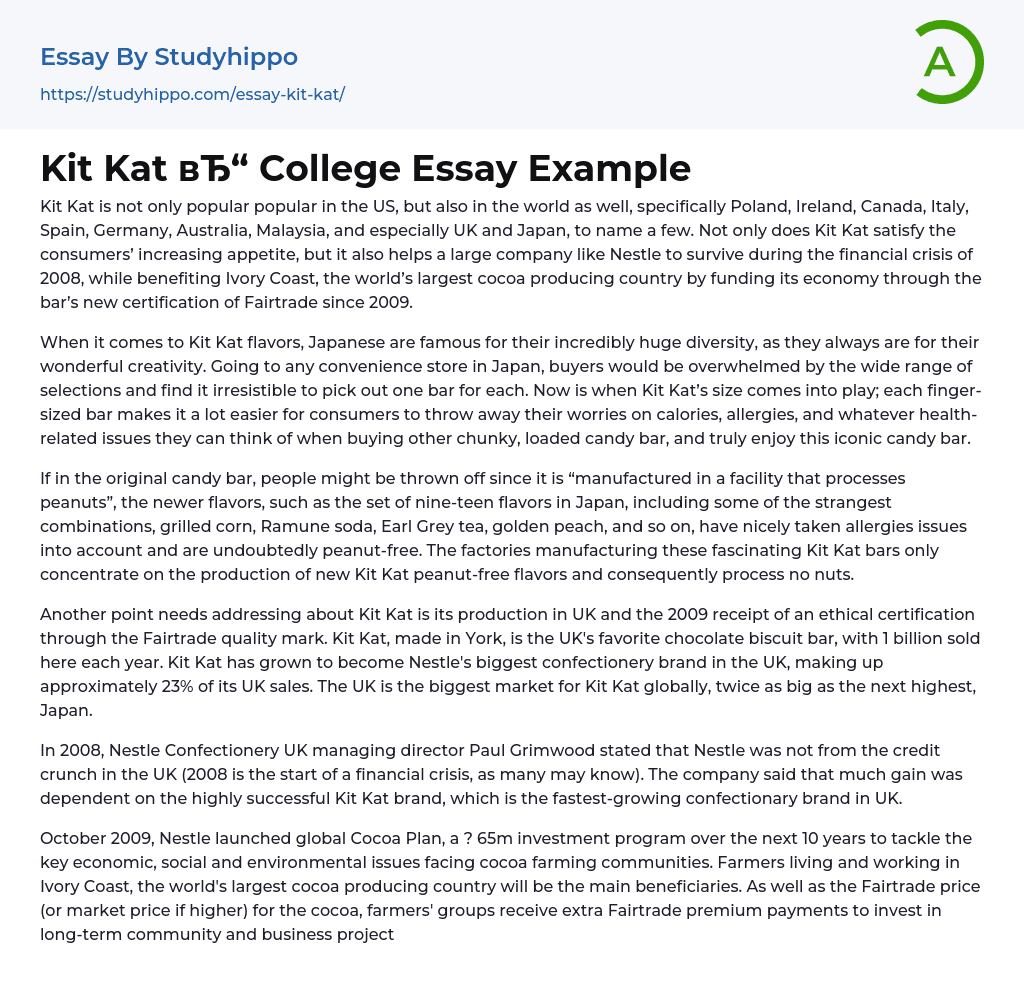Kit Kat is not only popular popular in the US, but also in the world as well, specifically Poland, Ireland, Canada, Italy, Spain, Germany, Australia, Malaysia, and especially UK and Japan, to name a few. Not only does Kit Kat satisfy the consumers’ increasing appetite, but it also helps a large company like Nestle to survive during the financial crisis of 2008, while benefiting Ivory Coast, the world’s largest cocoa producing country by funding its economy through the bar’s new certification of Fairtrade since 2009.
When it comes to Kit Kat flavors, Japanese are famous for their incredibly huge diversity, as they always are for their wonderful creativity. Going to any convenience store in Japan, buyers would be overwhelmed by the wide range of selections and find it irresistible to pick out one bar for e
...ach. Now is when Kit Kat’s size comes into play; each finger-sized bar makes it a lot easier for consumers to throw away their worries on calories, allergies, and whatever health-related issues they can think of when buying other chunky, loaded candy bar, and truly enjoy this iconic candy bar.
If in the original candy bar, people might be thrown off since it is “manufactured in a facility that processes peanuts”, the newer flavors, such as the set of nine-teen flavors in Japan, including some of the strangest combinations, grilled corn, Ramune soda, Earl Grey tea, golden peach, and so on, have nicely taken allergies issues into account and are undoubtedly peanut-free. The factories manufacturing these fascinating Kit Kat bars only concentrate on the production of new Kit Kat peanut-free flavors and consequently process no nuts.
<
style="text-align: justify">Another point needs addressing about Kit Kat is its production in UK and the 2009 receipt of an ethical certification through the Fairtrade quality mark. Kit Kat, made in York, is the UK's favorite chocolate biscuit bar, with 1 billion sold here each year. Kit Kat has grown to become Nestle's biggest confectionery brand in the UK, making up approximately 23% of its UK sales. The UK is the biggest market for Kit Kat globally, twice as big as the next highest, Japan.
In 2008, Nestle Confectionery UK managing director Paul Grimwood stated that Nestle was not from the credit crunch in the UK (2008 is the start of a financial crisis, as many may know). The company said that much gain was dependent on the highly successful Kit Kat brand, which is the fastest-growing confectionary brand in UK.
October 2009, Nestle launched global Cocoa Plan, a ? 65m investment program over the next 10 years to tackle the key economic, social and environmental issues facing cocoa farming communities. Farmers living and working in Ivory Coast, the world's largest cocoa producing country will be the main beneficiaries. As well as the Fairtrade price (or market price if higher) for the cocoa, farmers' groups receive extra Fairtrade premium payments to invest in long-term community and business projects of their own choice, such as education and healthcare. The sugar in the product will also be Fairtrade certified sourced from Belize.
The trade and development minister, Gareth Thomas was quoted as saying "I am glad to see Kit Kat become Fairtrade certified, giving more British shoppers the chance to improve the lives of some of
the world's poorest people. This will give thousands of Ivorian cocoa farmers better opportunities to trade their way out of poverty. " So, what can be better than enjoying the world’s favorite biscuit bar during break time, while virtually helping thousands of people in their financial distress at the same time?
- Professor essays
- Should College be Free essays
- Should college athletes be paid essays
- College Education essays
- College Tuition essays
- Graduation essays
- College Goals essays
- Personal Statement essays
- Online Classes Vs Traditional Classes essays
- Online Education essays
- Student Loan essays
- Study Abroad Scholarship essays
- Reasons To Go To College essays
- Paying College Athletes essays
- Technology In The Classroom essays
- Anorexia essays
- Breakfast essays
- Caffeine essays
- Chewing gum essays
- Child Development essays
- Chocolate essays
- Diet essays
- Dieting essays
- Eating essays
- Eating Habits essays
- Energy Drink essays
- Food essays
- Genetically Modified Food essays
- Genetically Modified Organisms essays
- Junk Food essays
- Metabolism essays
- Milk essays
- vegetarian essays
- Vitamin essays
- Weight Loss essays
- Classroom essays
- College essays
- E-Learning essays
- Elementary School essays
- Examination essays
- Graduate School essays
- High School essays
- History Of Education essays
- Homeschooling essays
- Kindergarten essays
- Middle School essays
- Public School essays
- School essays
- Single Sex Schools essays
- Special Education essays




